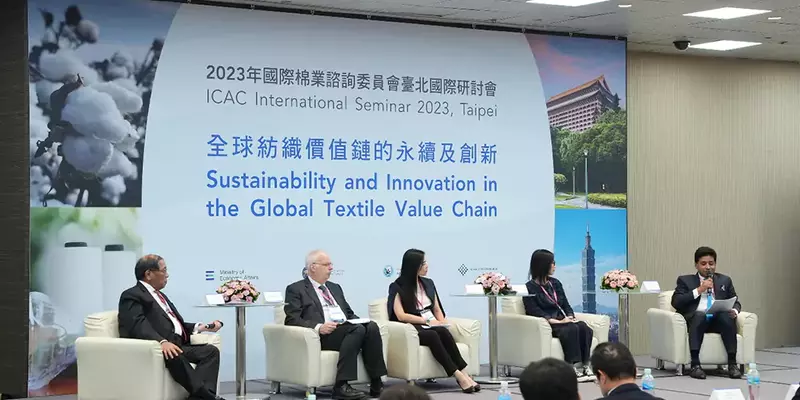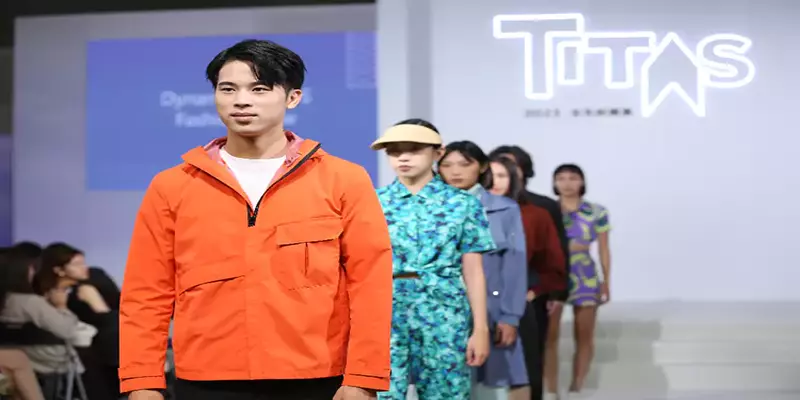The 27th Taipei Innovative Textile Application Show (TITAS) came to a successful close at Taiwan’s Nangang Exhibition Centre last week (19 October 2023). The event attracted 381 exhibitors from 16 countries who showcased key innovations in critical trend areas across the textile value chain to promote the green transformation of the industry.
Taiwan’s textile industry ranks first in the world in terms of functional and green fabrics and stakeholders are continuously transforming, upgrading and actively engaging in innovative R&D. TITAS is Asia’s key sourcing platform for textiles and clothing and participation in the event continues to rise. The number of exhibitors in 2023 increased by 3.8% from 2022, with 6% more booths this year.
A total of 35,000 visitors from the US, Canada, the UK, Germany, Italy, Spain, Netherlands, Norway, Sweden, South Africa, Australia, New Zealand, Japan, South Korea and Bangladesh networked with 381 exhibitors across 952 booths during the three-day exhibition period. This was an increase of 6% compared to the 2022 edition.
This season’s procurement focused on the multifunction of woven and knitted textiles that combine sports, outdoor leisure, fashion and home textiles. These sought-after materials offer properties including moisture-wicking, waterproof and moisture-permeability, anti-UV, far-infrared, insulation and temperature regulation, deodorisation, antibacterial, antifouling and high strength and wear resistance.
Future business opportunities generated by the event are estimated to be approximately US$47m, according to the organiser, Taiwan Textile Federation (TTF), in partnership with the International Trade Administration of the Ministry of Economic Affairs.
To keep its finger on the pulse of the global market, TITAS focuses on the three core themes of “Sustainability, Functional Applications, and Intelligent Manufacturing” to showcase the achievements of Taiwan’s textile industry in innovation and sustainability.

Innovations in sustainability
Green textiles were at the forefront of the exhibits at TITAS this year. Driven by the net-zero wave in the global supply chain, textile companies are actively transforming their businesses into low-carbon operations. Building a green supply chain is critical for companies developing sustainable credentials. As leading brands such as Nike, Adidas and Lululemon (to name but a few) set net-zero carbon reduction goals, Taiwan’s textile industry – which plays an important role in the global value chain – is actively building a functional and green supply chain to cater for buyers’ needs.
During the opening ceremony, a runway show dubbed Sustainable Fashion Show was staged, which was a collaboration between Taiwan textile companies and designer brands and coordinated by the Ministry of Culture to showcase the achievements of Taiwan’s fashion value chain.

Taiwan Textile Federation (TTF) Chairman Kuo highlighted that climate change is becoming an increasingly severe challenge to business operations and achieving sustainable development has become the concern of the global textile industry. He said Taiwan’s textile industry was investing considerable resources and efforts in decarbonisation and sustainability, which made it a reliable partner for global brands who were trying to achieve net zero.
Exhibitors saw examples of innovative technology that has been devised to promote the sustainable development of functional textiles. There was a wealth of cutting-edge solutions for environmentally friendly recycling including repurposing agricultural waste to make yarn from cocoa and pineapple fibre; making biofibres from non-edible corn, sucrose, castor oil and other plants; and using recycled tyres to make regenerated nylon.
Other new technology on show included new methods of turning recycled clothing and fabric scraps into raw materials and making regenerated nylon fibre from waste fishing nets and oyster ropes. There were also examples of waterless dyeing and low-temperature dyeing to reduce wastewater and energy consumption.
In terms of functional applications, TITAS exhibitors emphasised functional considerations in comfort, health, leisure, sports, safety, protection and medical care, including water-based waterproof and breathable membranes, high-efficiency deodorising polyester fibres, functional graphene, etc.
What’s more, to move towards green transformation and low-carbon production goals, textile machinery manufacturers are promoting Industry 4.0 technologies and automation, including data collection and analysis and artificial intelligence (AI). Specific solutions showcased at TITAS in-line with this movement include RFID yarn, AI fabric inspection machines, automatic sampling looms, digital textile inkjet printers, a smart manufacturing data control centre and smart weaving, etc.

























